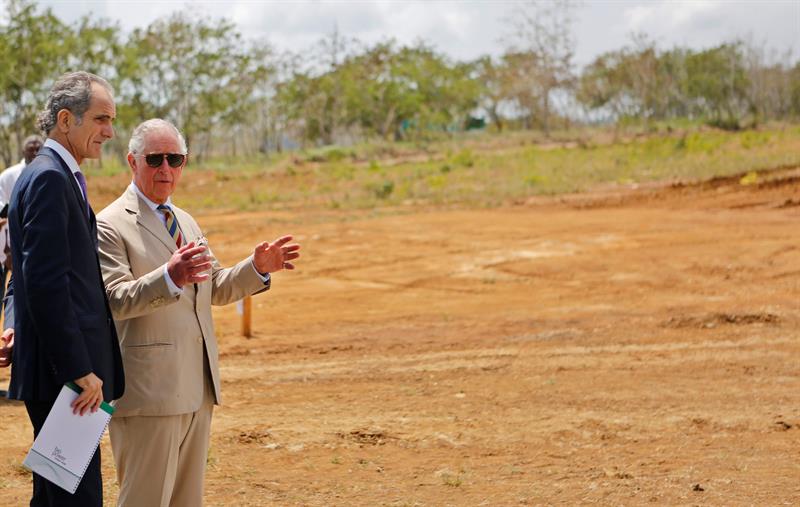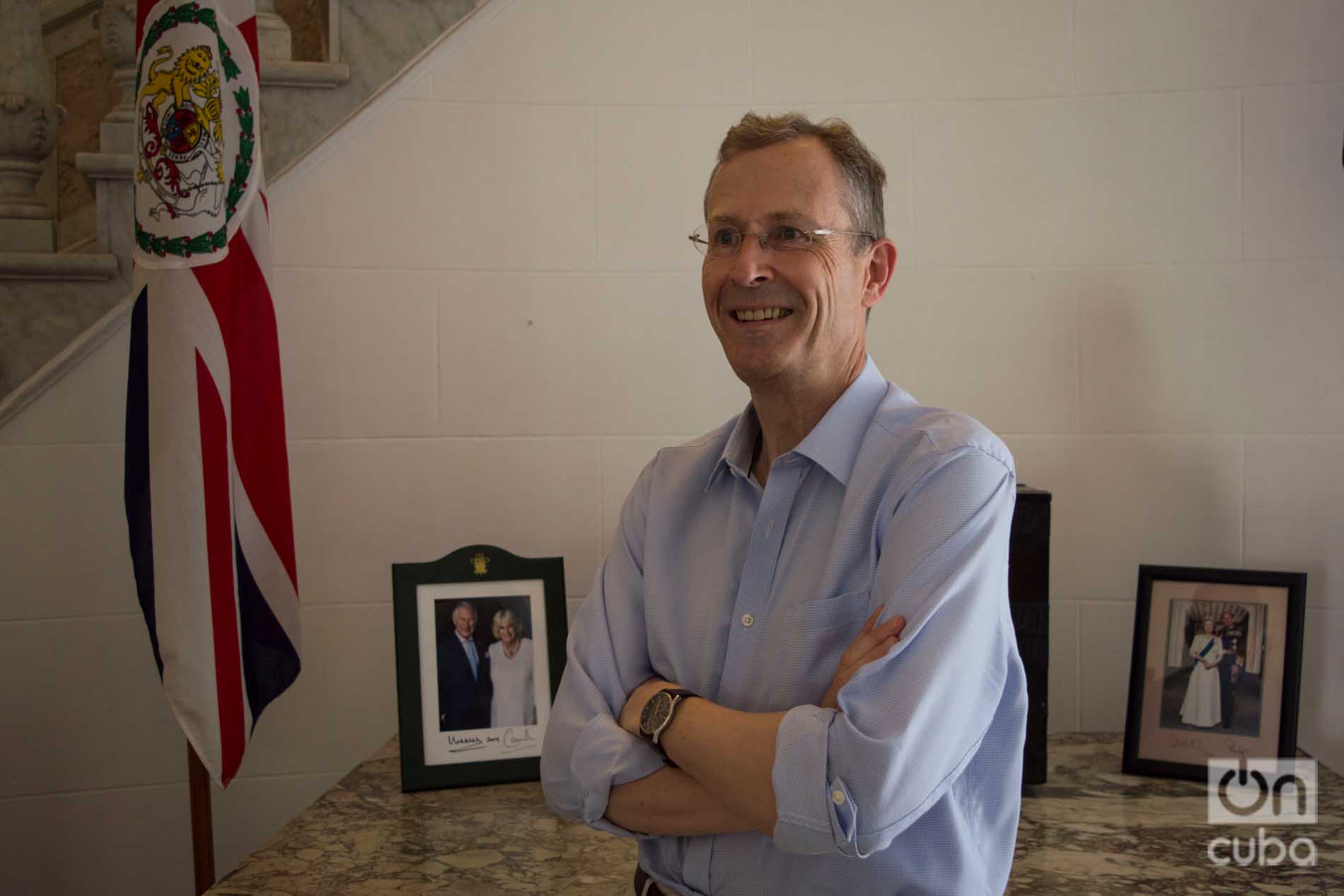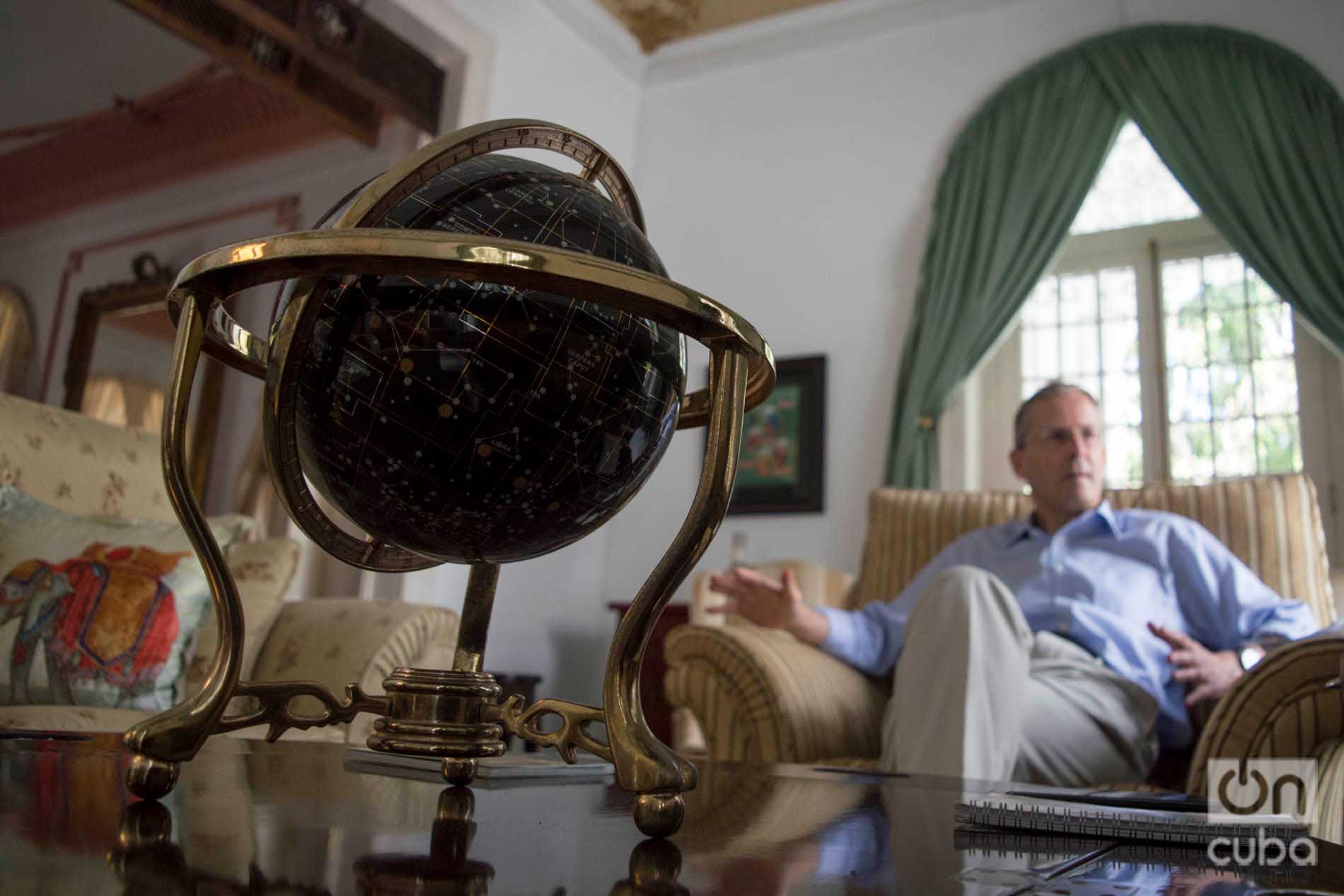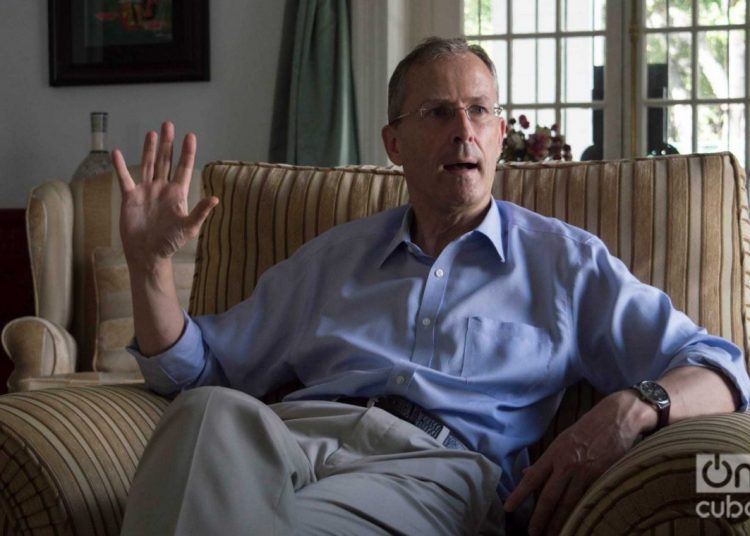Three weeks ago, relations between Cuba and the United Kingdom lived a momentous moment with the trip of the Prince of Wales and the Duchess of Cornwall to the Island. Never before had a member of the British Royal House trod Cuban soil on an official visit.
The symbolism and the impact of this fact are indisputable.
“Although it was not a government visit, but a Royal one, due to its scope and extension it demonstrated the two countries’ progress in bilateral relations and the will to continue advancing,” Mr. Antony Stokes, Ambassador of the United Kingdom in Havana, told OnCuba.
“The visit was very substantial and emotional, with many different elements, which served for the Prince and the Duchess to learn about Cuban culture and life and to exchange with the people, not only with President Miguel Díaz-Canel and other government representatives, which was very important, but also civil society: artists, entrepreneurs, members of community projects, with people in the streets, something that interested them very much.
“In addition, it allowed for showing substantive cooperation and bilateral exchange projects, and also for direct meetings by officials of our government, who accompanied Their Royal Highnesses, with Cuban Foreign Minister Bruno Rodríguez, Deputy Foreign Minister Ana Teresita González and other Cuban officials. It was a moment that went down in History, and my team and I are very proud to have been part of it.”
In what context of relations between the two countries did the visit take place?
The visit of Their Royal Highnesses cannot be separated from the rapprochement that the two countries have promoted in recent times, and that last November led to President Díaz-Canel’s trip to London.
What started as a stopover after a tour of Russia and Asia, of Cuba’s traditional allied countries, in practice was a working visit, the first of a Cuban president since independence.
Díaz-Canel carried out a broad program of exchanges with members of the government, of the two Houses of Parliament, with businesspeople, with other organizations, with Chancellor of the Exchequer Philip Hammond (who was, in his time, the first Foreign Secretary of the United Kingdom to visit Cuba after the Revolution, in 2016), and with the Prince of Wales himself, whom he then personally invited to visit Cuba.
He also had a cultural program, which included the British Museum and the Abbey Road studio, because the Cuban president is a Beatles fan.
Thus in just five months we have had two historical visits, that of Their Royal Highnesses and that of President Díaz-Canel, one in each direction.
It’s something extraordinary and it’s the result of the commitment to strengthen relations, despite the differences between the two countries: differences in political and economic systems, in points of view on very important issues such as human rights aspects, or regional issues, like the situation in Venezuela.
However, we believe we can cooperate in joint projects and carry out political talks. There are potentials to work more together despite our differences.
Which sectors have the greatest links and perspectives?
There are really many opportunities for bilateral relations and not enough resources, people and time to exploit them all. I would like to be able to do more, but practice tells us to focus on certain issues we are already working on and that have promising prospects.
One of them is energy and renewable energy. Just during the Royal visit, a new solar park project was launched in the Mariel Special Development Zone, which is very important because when it is finished it will cover around 3% of the country’s energy needs.
It’s going to be the largest park in Cuba and probably the entire Caribbean, and for its execution it attracted foreign investment, an element whose need is underlined in the new Constitution and must be an increasingly important part of the Cuban economy.

During the Royal visit we also organized a demonstration of a machine that cuts the marabú weed that grows in idle fields and that will be used as fuel in a biomass plant that is being built in Ciro Redondo, in the province of Ciego de Ávila. It is a project led by another British company.
The 62 MW plant is already almost built and will also make an important contribution to the Cuban electricity system, and Cuba’s goal of using more and more renewable energy sources, due to its economic and environmental benefit.
But we are also working in the energy sector in general, because the role of oil and gas continues to be predominant in Cuba, and the Castrol company, which is British, keeps working closely with Cupet and adapting to environmental requirements for its presence to continue being significant on the Island.
There are also biotechnology and life sciences, to the point that the Royal visit included an event at the Molecular Immunology Center to the west of Havana.
This is a sector in which there are several bilateral collaboration projects, with links to three British universities for the development of medicines for the treatment of diseases such as cancer, but which also seek to support Cuba in the marketing of global-level products, because they are based on the good experiences and results of research carried out by Cuban scientists. And this is also a very strong sector in the United Kingdom, and represents an opportunity for a broader and more productive cooperation that allows for greater development, not only for the two countries but also internationally, because it can save lives.
What is the state of key areas such as investment and tourism?
British investments are currently smaller than the potential Cuba offers, but not because of that do they stop being important for us. In addition to those already mentioned in the energy sector, another example that shows the steps taken in this direction is Aberdeen Standard, the first investment fund to the island launched on the London Stock Exchange, which is promoting investments in the tourism sector in hotels and also in other fields.
We believe that Cuba is at a moment of opportunity for the people and that the new Constitution can serve as a platform for development with the recognition of the private sector and foreign investment.
The economic and financial field offers many possibilities for cooperation, and British experiences and potentials could be useful to Cuba, not only to encourage business, but also for exchange based on a strategic vision on the development of the economy. That could be another important point of focus in bilateral relations, especially at this time.
In terms of tourism, the United Kingdom is one of the main issuers of visitors to Cuba, even if the figures may fluctuate a little from one year to another and that an event such as Hurricane Irma had an impact last year on the arrival of British visitors, which mostly use the “all-inclusive” modality in sun and beach areas such as Guardalavaca, Varadero and the keys to the north of Cuba, which were affected by the hurricane.
But I think the decline produced by this phenomenon was timely and the picture should start changing, because before Irma we were growing, in an order of 40% in 2017, and the trend under normal conditions should be a growth of British tourism as a significant part of the general increase of this sector in Cuba.
I came here as a tourist in 1994, at a very difficult time for the country, in the middle of the great economic crisis of the so-called “Special Period,” but in spite of that I got a positive impression. I was struck by the hospitality and spirit of the people in the midst of the difficulties, it remained in my memory for more than two decades until I was able to return as Ambassador, and I think that Cubans’ spirit is a very important value that attracts visitors and I hope more of my compatriots can get to know it.

What role do education and culture play in bilateral relations and, in particular, the work of the British Council?
Education is a priority sector in our relations with Cuba and, within this, the work of the British Council is fundamental. In fact, during the Royal visit the British Council and the Cuban Ministry of Higher Education signed an agreement to advance cooperation in education, in the teaching of the English language, but also in other directions.
The objective of this and other agreements with several Cuban universities, is that there be an exchange in both directions. In the United Kingdom we have great experience in teaching the English language, for obvious reasons, and also a recognized strength in higher education, with several of the best universities in the world; but the reputation of Cuban education is also very strong, it is a governmental priority and it has internationally respected programs, so through these agreements both countries can learn from each other.
The British Council is also linked to cultural projects, such as Islas Creativas, an image that I think is very accurate because that is what we are: two creative islands at the tips of the immense Atlantic Ocean, with very different cultures, but that at the same time having a strong impact on the world.
Cuban culture is well-known and admired internationally, and ours as well, and a collaborative relationship in this sector is very enriching because it is a special field for Cuba and the United Kingdom.
A concrete example is dance, which is a very strong art in both countries and has a figure like Carlos Acosta, recently appointed director of the Birmingham Royal Ballet and whose company in Havana was visited by Their Royal Highnesses.
In this manifestation the British Council has a joint project with Danza Contemporánea de Cuba, which has made it possible to bring important British choreographers every year to work with this incredible Cuban company and whose results have already been enjoyed on stage.
There’s another joint project that I think is fabulous, because it puts cameras in the hands of Cuban children to make small films, shorts, and the authorities and the communities involved here are interested in expanding it. Their Royal Highnesses saw an example of this project during their visit to the Muraleando community project, and what the children do in it is impressive.
The United Kingdom has been a traditional ally of the United States. What is the position of your country on the current U.S. policy towards Cuba, with measures that have even affected British companies and include the full activation of Title III of the Helms-Burton Act?
The United Kingdom has very close relations with the United States. We share values, political and economic positions, points of view about the international situation and, on Cuba in particular, we share concerns regarding, for example, the Cuban position on Venezuela and on various aspects of human rights, such as freedom of the press.
But our policy towards Cuba, like that of all of Europe, is very different from that of the United States, and I prefer to focus on it because for me it seems a positive and cooperative direction, based on bilateral exchange and a pragmatic diplomacy, which promotes cooperation and seeks to encourage a dialogue on all issues, including our differences.
The closer the dialogue, the better relations can be.

We do not deny the negative impact that the embargo and the measures recently approved by the U.S. government have on the Cuban people and economy. Nor can we agree with the extraterritorial application of the Helms-Burton Act.
Like the European Union as a whole, we do not believe that the extraterritorial application of U.S. policy on Cuba is correct or just. Title III also threatens with damaging British companies doing legitimate business here. That is why we have a legal statute that serves as an antidote for the affected British companies and individuals, as there is a European statute that blocks the effects of this act.
This shows in a very pragmatic way that we do not accept this type of extraterritorial application and our policy goes precisely in an opposite track, because it seeks to support the growth of commercial, cooperation, investments ties, to give a boost to the links, and if there are obstacles, well try to overcome them. And we support the same policy between Cuba and the European Union, whether we are members of this bloc or not.
Precisely, the United Kingdom is on the verge of applying the Brexit. How could this have an influence on relations with Cuba and the instruments already signed as part of the European bloc?
If we leave the bloc, we would cease to be part of the Political Dialogue and Cooperation Agreement signed by Cuba and the European Union, and, therefore, this would not apply to the United Kingdom. But we are traveling on the same path. We will continue relations, as was confirmed by the Royal visit, and maybe we can reach an agreement equivalent to that of the Union, but bilaterally.
That would certainly be a possibility that would symbolize the commitment of both parties to strengthen ties in the present and a more ambitious progress in the future to take advantage of existing possibilities. But, even with or without this formal agreement, we will continue in this direction.










